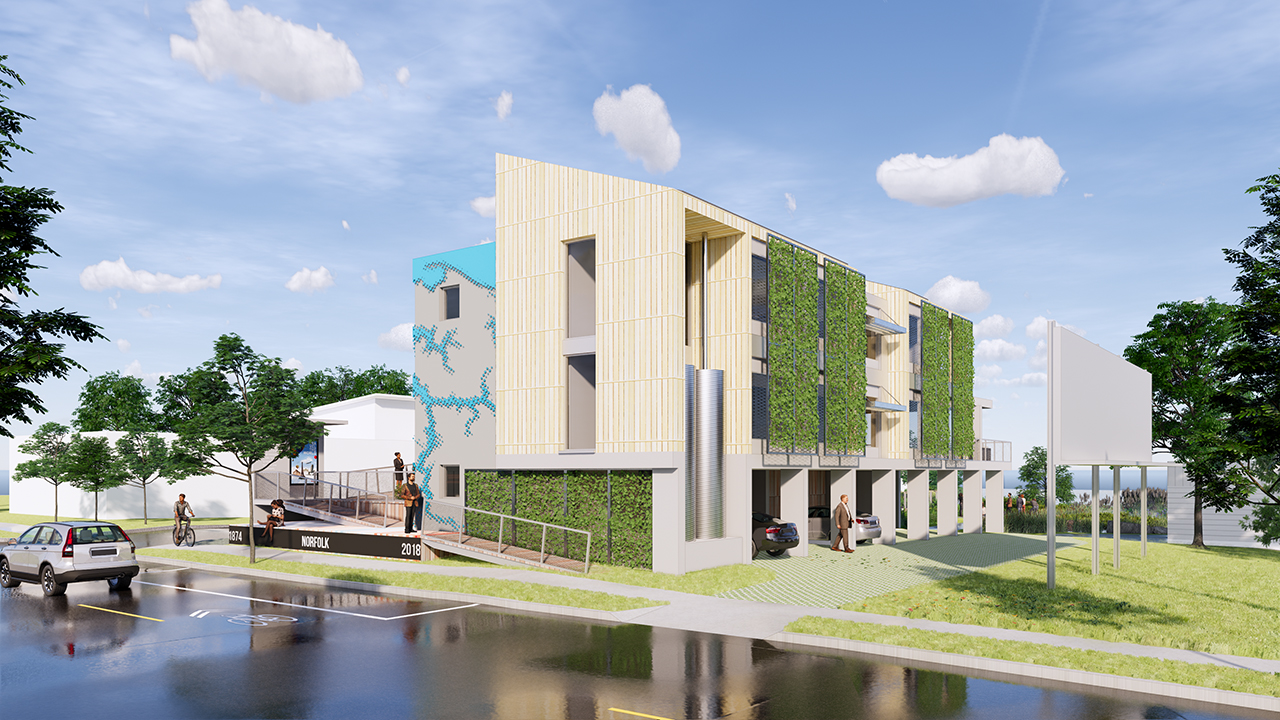The Next Wave Campaign with The Elizabeth River Project

The Elizabeth River Project is taking up position on the frontlines of the international quest to combat impacts of sea level rise on urban waterfront communities. WPA is proud to be designing the first facility on the East Coast intentionally to be constructed as a resilience model in the urban flood plain.

The Elizabeth River Project’s Resilience Lab will be a three-story, elevated, super-green facility and waterfront “Learning Park” constructed along one of Norfolk’s busiest commercial corridors, North Colley, at 4610 Colley Avenue. The purpose will be to make emerging, practical solutions available to businesses, citizens and students for how to continue to live and work on the waterfront despite one of the most accelerated rates of sea level rise in the world. The unique focus will be on safeguarding not only humans, but the ecosystem.
“The river is at much at risk from sea level rise as you and me,” says Marjorie Mayfield Jackson, Executive Director, Elizabeth River Project. “Researchers now say there can be as much runoff pollution washing into the river with a high tide in one day as we used to expect over an entire year.” Wetlands are also drowning, water temperature and salinity are being altered and these changes imperil marine life.
The Resilience Lab is just one element of the Elizabeth River Project’s new $9 million Next Wave Campaign. The Frank and Aimee Batten Challenge is also being announced. The Battens, of Norfolk, will match every dollar donated to the campaign with another dollar for up to $1 million.
Additional projects to be achieved by the campaign include:
- Doubling the size of the Elizabeth River Project’s Fred W. Beazley River Academy at Paradise Creek Nature Park in Portsmouth. This will accommodate growing environmental education programs including internships for inner-city youth to learn marketable conservation horticulture skills. The park is a unique partnership of the non-profit and the City of Portsmouth. “We’re expanding river-wide,” says Jackson.
- Achieving a sustainable funding base for all the Elizabeth River Project’s pioneer education programs. These also include the Dominion Energy Learning Barge, “America’s Greenest Vessel,” powered by sun and wind. In keeping with the goal to expand river-wide, a docking plan is in the works to move the barge throughout the four-city region of the Elizabeth River.
“This campaign has greater potential to position Elizabeth River Project for long-term success with enlisting the larger community in our mission than just about anything we’ve ever done,” said Bruce Bradley, campaign co-chair and past board president. Founded in 1993, the Elizabeth River Project works to restore the environmental health of the Elizabeth River through citizen, business and government partnerships.
The Elizabeth River Project has raised 70% of the campaign goal but is counting on the community to donate the remaining funds needed. Thanks to a generous early donor, the park facility is scheduled to be constructed first, as early as next year. Depending on fundraising success, the Resilience Lab will follow soon after.
In an unexpected and exciting outcome of the Elizabeth River Project’s planning effort for the Resilience Lab, Old Dominion University has now decided to co-locate its Institute for Coastal Adaptation and Resilience across the street on North Colley Avenue in order to take advantage of collaboration opportunities. The two facilities will have very different missions but many opportunities for synergy, in effect creating a “resilience eco-corridor.”
- Operating in a state-of-the-art waterfront facility, Elizabeth River Project will focus on demonstrating practical resilience approaches for the public and will showcase emerging efforts of multiple universities and partners in a Learning Park to be open to the public.
- The Old Dominion institute will be housed in an existing, non-waterfront facility as institute staff and faculty seek to engage the entire university campus in addressing resilience across disciplines. Access to the Elizabeth River Project’s facility will provide opportunities for joint workshops and for students and interns to observe and apply research in a real-life setting.
The public can donate to the Next Wave campaign at elizabethriver.org, or stop by an outdoor kiosk at Elizabeth River Project’s new interim field station on North Colley at 5205 Colley Avenue, Norfolk, starting June 17. More at elizabethriver.org.
View fly through video of The Elizabeth River Project Resilience Lab.
Elizabeth River Project, norfolk, Resilience, wpa, wpa studio